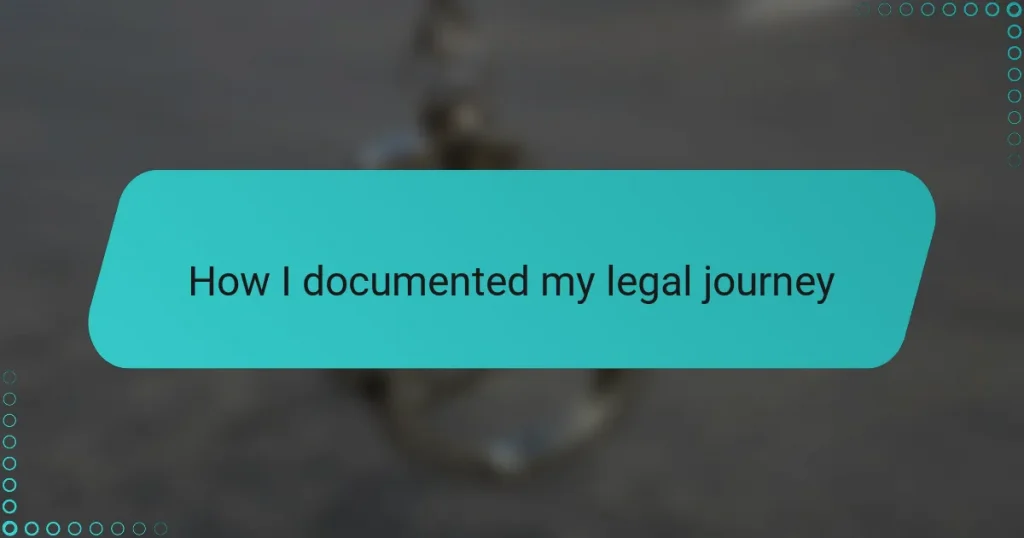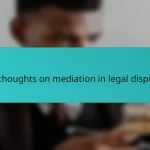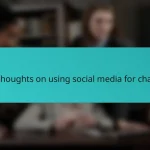Key takeaways
- Legal advocacy is about giving voice to the marginalized and requires constant learning and patience.
- Documenting your legal journey aids in processing experiences and provides clarity and strength throughout challenges.
- Effective organization of legal documents enhances preparedness and emotional grounding during the process.
- Sharing your story safely builds connections while maintaining privacy, and resilience is key in overcoming setbacks.
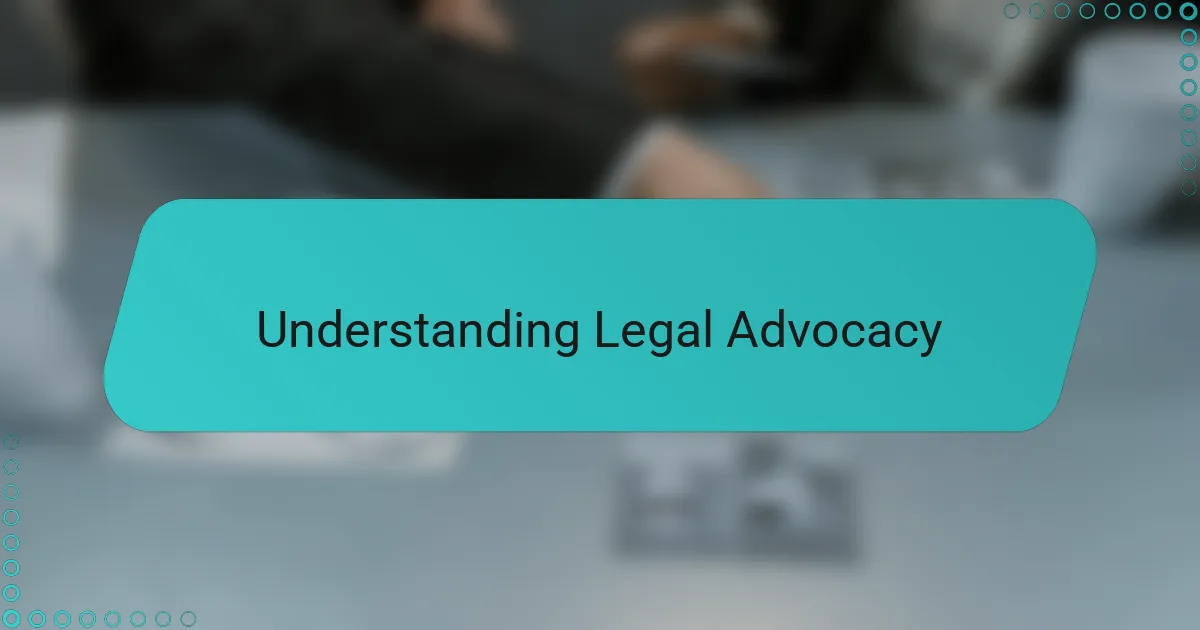
Understanding legal advocacy
Legal advocacy, to me, is more than just understanding laws—it’s about giving voice to those who might otherwise be ignored. Have you ever felt overwhelmed by legal jargon or the complexity of the system? I certainly have, and that’s what made me realize how crucial advocates are in bridging that gap.
When I first started documenting my legal journey, I discovered that advocacy is deeply personal. It’s not just about winning cases; it’s about fighting for fairness and justice in a way that resonates emotionally. I remember feeling both vulnerable and empowered, knowing that having someone by your side who truly understands the legal landscape can make all the difference.
What struck me most is that legal advocacy involves constant learning and patience. It challenges you to see the world from multiple perspectives and compels you to ask tough questions—like, whose rights are at stake here, and how can I help ensure they’re protected? This reflection became central to how I approached every step of my journey.
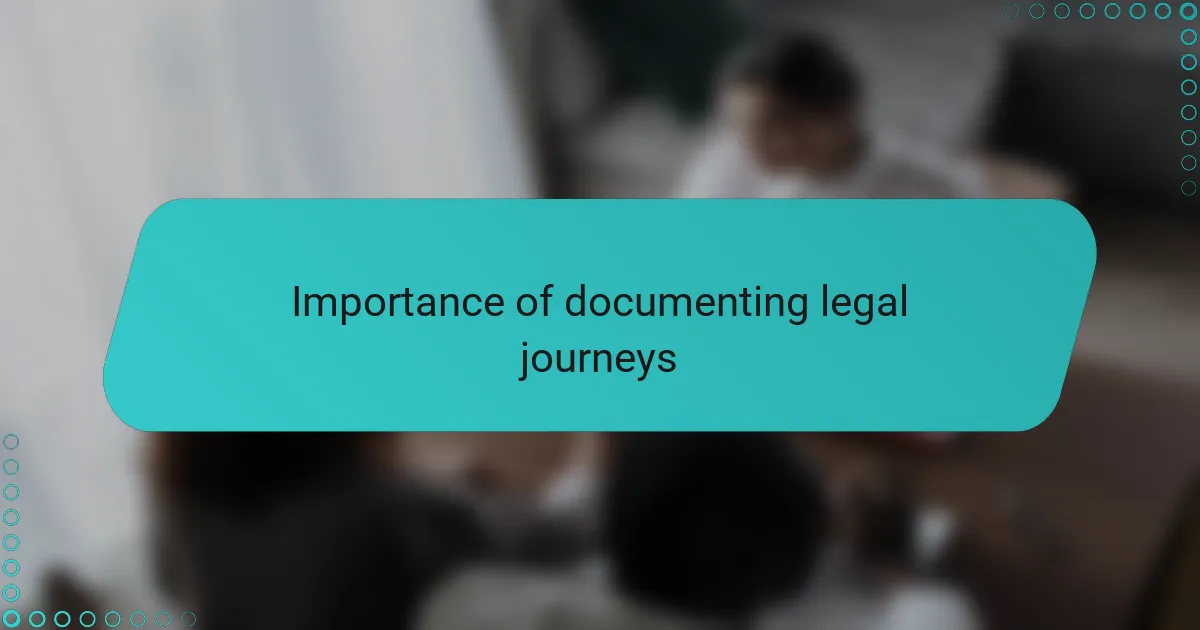
Importance of documenting legal journeys
Documenting my legal journey wasn’t just about keeping records—it became a lifeline that helped me process each challenge and milestone. Have you ever tried remembering every detail of a complex case without notes? I quickly realized that without thorough documentation, crucial moments and insights could easily slip away, leaving me less equipped for what came next.
There’s something profoundly reassuring about having a written account of your experience. For me, it transformed uncertainty into clarity. When emotions ran high, and the legal maze felt overwhelming, revisiting my documentation grounded me—it reminded me where I’d been and how far I’d come, giving me strength to keep going.
Moreover, documenting my journey meant creating a resource not just for myself but for others. I wanted to show that behind every legal battle are real people with real stories worth hearing. Could sharing these experiences make legal advocacy more accessible? From my perspective, absolutely—it humanizes the process and invites empathy, which is the first step toward justice.
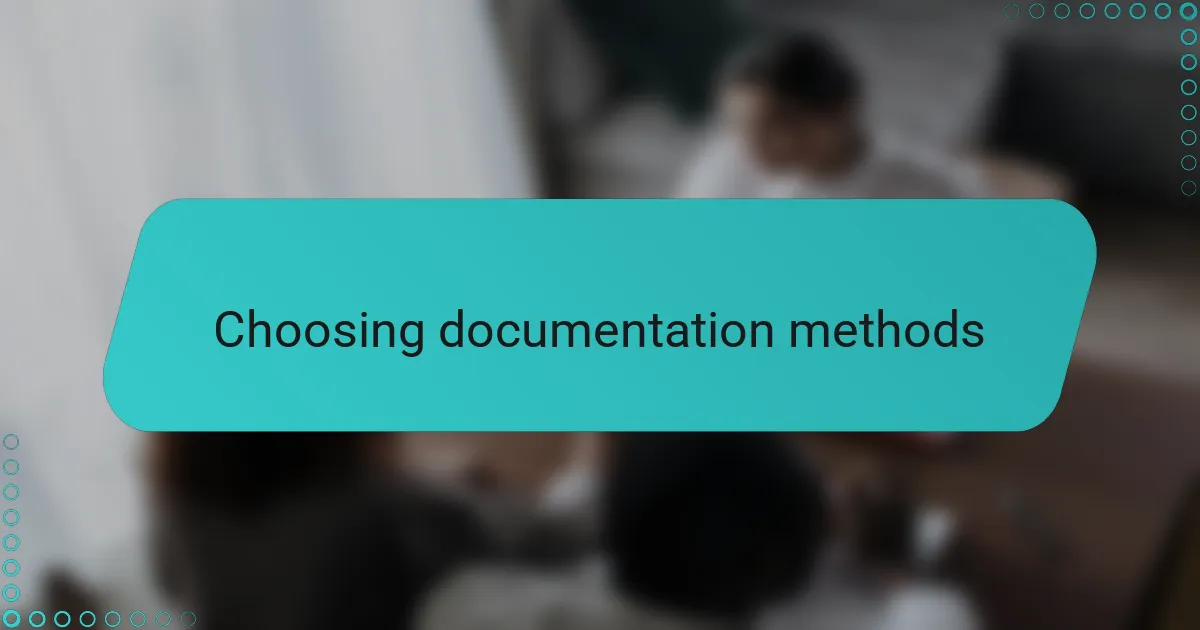
Choosing documentation methods
Deciding how to document my legal journey felt like choosing the lenses through which I viewed every twist and turn. Should I rely on handwritten notes, digital files, or even audio recordings? Each method promised different advantages, but I wondered which would capture the emotional nuances as well as the facts.
I found that mixing methods worked best for me. Writing detailed notes helped me process complex information, while voice memos captured the raw feelings and spontaneous thoughts that often escaped the page. Have you ever noticed how hearing your own voice can reveal perspectives you might overlook in writing?
Ultimately, the key was choosing tools that felt natural and manageable. If the documentation becomes a burden, it stops serving its purpose. For me, a flexible system allowed me to maintain consistency without feeling overwhelmed, making the act of documenting not just a task but a form of self-advocacy.
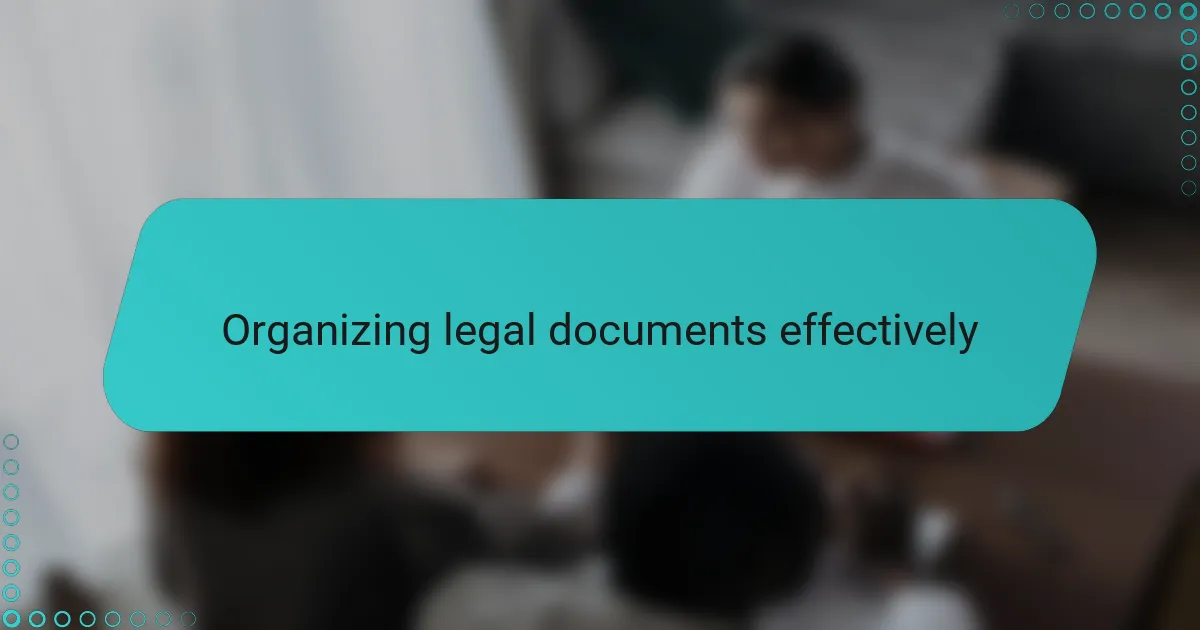
Organizing legal documents effectively
Keeping my legal documents organized was a game-changer in my journey. I quickly learned that sorting papers by date and category saved me from frantic searches right before deadlines. Have you ever experienced the panic of misplacing a crucial contract or court notice? I wouldn’t wish that stress on anyone navigating the legal world.
I used labeled folders and a simple spreadsheet to track everything, from court filings to correspondence. This system gave me a clear overview and peace of mind, especially when I needed to reference specific details under pressure. Looking back, I realize that effective organization didn’t just keep me prepared—it helped me stay emotionally grounded when things felt chaotic.
Sometimes, I treated the process like creating a story, arranging events logically so the paperwork told a clear narrative of my case. This perspective made paperwork feel less like a chore and more like an empowering step that brought clarity and control. Isn’t it interesting how organizing documents can transform uncertainty into confidence? For me, it truly did.
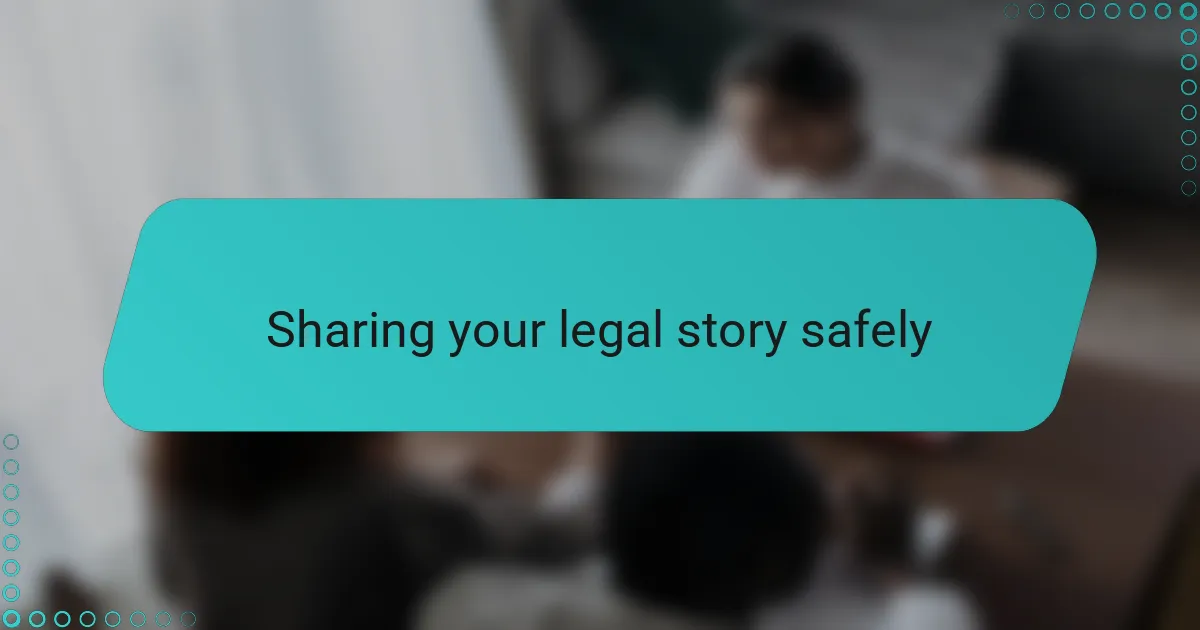
Sharing your legal story safely
Sharing my legal story safely meant thinking carefully about what details to reveal and to whom. Have you ever felt unsure about crossing a line between transparency and privacy? I definitely hesitated, knowing that some information could affect more than just me, so I chose to share thoughtfully, focusing on what would educate and inspire without compromising safety.
I also found it crucial to use secure platforms when posting or storing my story. For instance, password-protected files and encrypted messaging felt like a necessary shield against unintended exposure. Have you ever lost sleep worrying that your personal experiences might be seen by the wrong eyes? That fear pushed me to be more vigilant about protecting my narrative.
Balancing openness with caution isn’t easy, but it taught me the value of setting clear boundaries. Sharing portions of my journey helped me connect with others and advocate effectively, while keeping sensitive details private preserved my peace of mind. When you think about it, isn’t safeguarding your story a vital part of sustaining your advocacy? I truly believe it is.
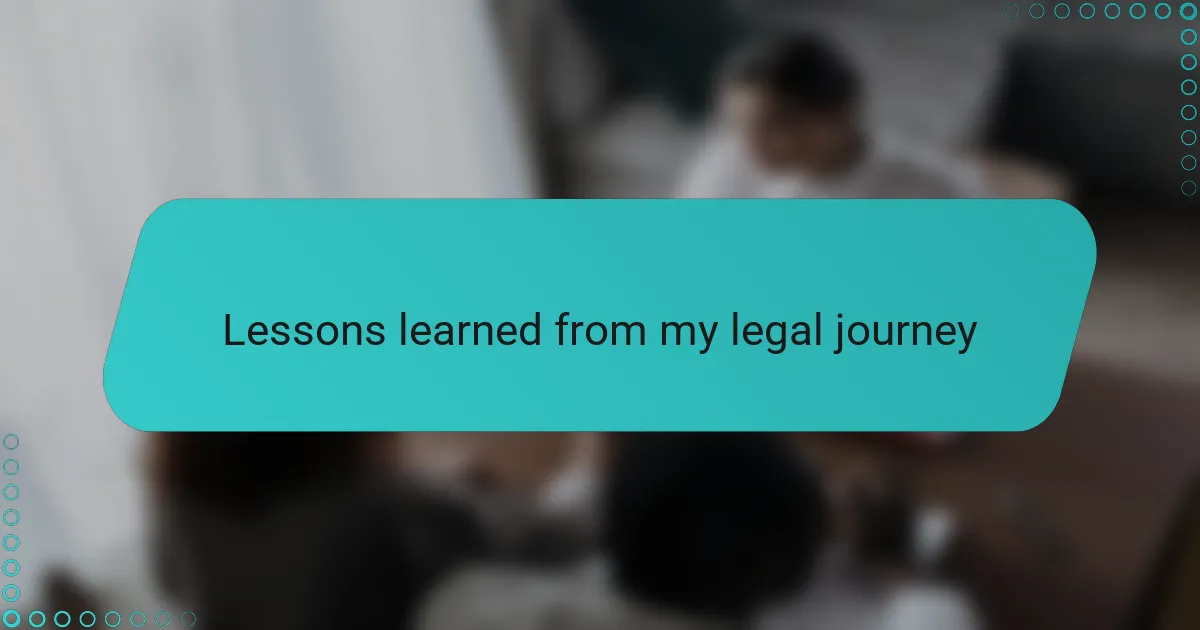
Lessons learned from my legal journey
One lesson that really stayed with me is how resilience isn’t just about enduring the legal process but learning from every setback and adjustment along the way. Have you ever felt defeated when things didn’t go as planned? I did, but each challenge showed me what wasn’t working and pushed me to rethink my approach, which ultimately made my advocacy stronger.
I also realized the importance of self-compassion during difficult moments. The legal world can be unforgiving, and it’s easy to blame yourself when progress feels slow or obstacles pile up. I found that allowing myself space to feel frustrated or overwhelmed actually helped me regroup and keep moving forward with renewed clarity.
Another insight was how vital community and support networks are in this journey. Asking for help or sharing experiences doesn’t make you weak—it builds solidarity. Have you noticed how just knowing someone else understands your struggle can change your perspective? For me, those connections became a wellspring of encouragement when the path felt lonely.
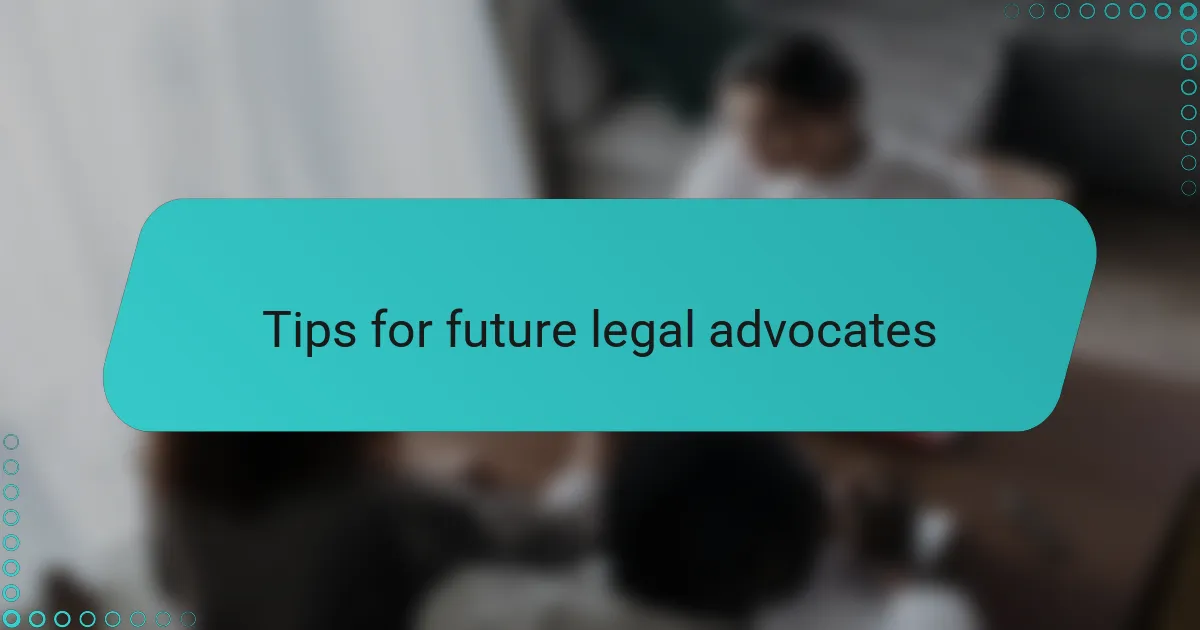
Tips for future legal advocates
When I first stepped into legal advocacy, I wished someone had told me to never stop asking questions—about the law, the people involved, and my own motivations. Have you ever caught yourself assuming you understand a case fully, only to realize a fresh perspective reveals new challenges? Staying curious keeps your advocacy sharp and your impact meaningful.
Another tip that truly helped me was embracing patience. Legal progress often feels slow, and frustration can creep in when results don’t match your effort. I remember moments when all I wanted was a quick win, but learning to trust the process made the journey more sustainable and the victories sweeter.
Finally, never underestimate the power of empathy. It’s tempting to get caught up in statutes and procedures, but connecting honestly with those you represent transforms your role from a legal technician to a genuine advocate. When you listen deeply, you’re not just helping cases—you’re championing people. Isn’t that what advocacy is really about?
